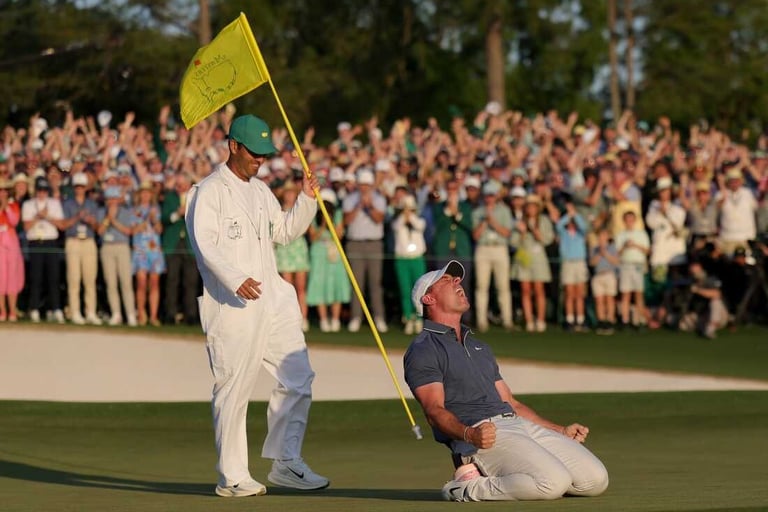Rami's Monthly Sports Digest Edition 4
Fresh off one of the most electric weekends in golf, I had to drop a bonus blog on The Masters. From legacy defining moments to the branding brilliance of Augusta National, this post breaks down why The Masters is special. Dive in as I unpack the golf, business, and everything in between while it’s still fresh. Only on Rami’s Sports Corner.
Rami Fakih
4/15/20257 min read


Surprise!!
WHATTT IS UPPP RAMI'S SPORTS CORNER FAMILY!!
As I sat on Sunday and watched Rory win his grand slam. The first thing I did Monday morning was pull out the computer and start writing a special extra blog about The Masters after watching that incredible weekend of golf. I’m still thinking about the shots, the storylines, the glory it was too good not to talk about.
So, I’m sitting here reflecting and writing, and it really hit me: this blog has become something I genuinely look forward to each month. What started as a small idea has grown into something I truly love building, and I’m grateful for everyone who's been following along. Whether this is your first read or you’ve been rocking with me since the beginning, thank you.
With The Masters still fresh and the buzz still real, I wanted to share a piece while it's hot and on my mind. So with that, welcome to the fourth edition of Rami’s Monthly Sports Digest- a special blog about the MASTERS.
The Masters: A Tradition Like No Other
Every April, the world turns its attention to Augusta, Georgia, for what many consider the big one for professional golf, The Masters Tournament. But The Masters is more than just a golf competition. It’s a global brand built on tradition, exclusivity, and a business model that fights the typical playbook of modern sports. From its special controlled broadcast strategy to its iconic $1.50 food, The Masters offers a rare mix of prestige and glory making it one of the most fascinating sporting events in the world. If you were like me a this past weekend you were glued to your tv screen, watching one of the best masters of all time. With that being said though in classic Rami’s Sports Corner fashion let's dive into the key aspects that make The Masters such a unique and powerful spectacle.
Broadcasting: Tradition Over Revenue
Most major sporting events chase massive broadcasting rights deals the NFL, for example, earns over $10 billion annually from its TV contracts. As we shared in Edition Three, WWE sold its Monday Night Raw TV rights to Netflix for $5 billion. But The Masters takes a different approach. Augusta National Golf Club intentionally leaves millions on the table by refusing to auction off long-term rights.
So, what does this mean? Instead of selling the TV rights to the highest bidder, Augusta partners with CBS and ESPN through short term agreements. This allows them to maintain full control over how the event is presented.
There are only four minutes of commercials per hour, the commercials are from the same 4 companies all four days, which is an unheard of thing in sports broadcasting. To put that in perspective, a typical NFL or NBA game airs about 15-20 minutes of ads per hour. This approach is about more than it's strategic. Augusta National uses it to preserve the purity and glory of the tournament, control its image, and create a viewing experience that feels timeless. The nonstop play, quiet commentary, and camera work reflect the values Augusta holds which is class.
CBS has broadcast The Masters since 1956, one of the longest-running relationships in sports television, the production still evolves since then with new drone shots, AI-powered statistics, and live digital apps and features, without disturbing the presentation. In short, Augusta wants viewers to feel like they're watching a sporting masterclass not a commercial filled viewing experience.
Tickets: Raffle, Prestige, and a Secondary Market SURGE
Getting a ticket to The Masters is like winning the golden ticket to Willy Wonka’s factory. Each year, hundreds of thousands of people enter Augusta’s public lottery to purchase tickets but obviously only a small amount of them actually get tickets. Practice round tickets cost $100, while daily tournament passes are $140 retail. Augusta National prioritizes accessibility and affordability for the working class but only if you're lucky enough to win the raffle.
Because demand wildly outweighs supply, the secondary ticket market explodes. In 2025, single-day Masters tickets were reselling for an average of $2,370, with four-day passes peaking at $14,000. Despite Augusta’s efforts to stop this, these sky-high prices reflect the prestige and limited access of attending the tournament.
Even the way tickets are delivered feels specials guests receive engraved badges instead of QR codes or printouts. For many sports fans and golfers, attending The Masters is a once-in-a-lifetime experience, and Augusta National does everything it can to make it feel that way, one day I hope to be there.
Merchandise: On-Site Only
Augusta National’s merchandise is some of the coolest in all of sports. Unlike the NBA or NFL, you can’t buy official Masters gear online everything must be purchased on-site during tournament week.
This strategy is insane. In just one week, the tournament generates an estimated $70 million in merchandise sales, averaging more than $10 million per day, I don't think some fathom how insane that is. Patrons often spend hundreds to thousands of dollars in a single trip (shoutout my brother soona for telling me this I had to do my research after), getting polos, hats, mugs, towels, umbrellas, golf balls, and even limited-edition gnomes which are like gold there and resell on eBay for triple their price.
The operation is massive. Augusta’s main merchandise pavilion spans 64,000 square feet, making it larger than many department stores. Each item is branded and updated annually, meaning fans return every year for new colorways, logos, and collectibles. And with the rise of resale culture, people that go attend The Masters just to flip merchandise.
Concessions: Affordable and Iconic
If you go to sporting events like me you know hot dogs cost $8 and popcorn can be $10, but The Masters is like we've seen before different. Signature items like the pimento cheese sandwich, ice-cream sandwich etc are all priced at just $1.50, while domestic beer costs $6 I don't drink but apparently thats very cheap to my bear drinkers. The entire menu feels like its from a 1980s diner.
Concession pricing hasn’t changed in decades, displaying Augusta’s message: hospitality over profitability. The food isn’t just affordable t’s a cultural staple. Items come wrapped in Masters-branded packaging, adding to the memorabilia factor. Too top it off Augusta sells over 350,000 sandwiches and 200,000 beers over tournament week. EVEN THE FOOD IS SPECIAL!
Prize Money: Golfers get PAID
The 2025 Masters shattered records with a prize purse of $21 million, up from $18 million the year before. Winner Rory McIlroy this year took home $4.2 million, while runner-up Justin Rose received $2.2 million. Which is a lot for a gold tournament.
Caddies also get a slice of the pie. Rory's caddie, earned a 10% cut, totaling $420,000. And unlike other events, The Masters champions receive a lifetime invitation to return each year, not to mention a green jacket, gold medal, and a spot in golf history(this last part is what really matters though, legacy engraved forever).
The tournament doesn’t rely on excessive sponsorships to fund these payouts, either. With income from media, merchandise, hospitality, and property rights, Augusta can pay top-tier purses while maintaining its exclusive feel.
Local Rentals: Locals win big
While The Masters lasts just one week, it transforms the real estate economy of Augusta for months. Local residents often Airbnb their homes to visitors, media, corporate guests, and even players. A typical rental near the course can go anywhere between $10,000 and $20,00 for the week which enough to cover an entire year’s mortgage for many families.
Some upscale homes earn $30k even more, especially if they come with amenities like golf simulators, chef services, or proximity to Augusta National’s entrance. If you dont believe me look up airbnb options for next years masters because they're already up.
This short-term rental economy injects millions into the local housing market, creating opportunities for both short-term income and long-term property investment. As someone who's a rea-estate junkie I find this to be actually insane. For many Augusta families, it’s their most profitable week of the year.
Economic Impact: A Billion-Dollar Week
The Masters is one of the largest economic events in Georgia, with an estimated total impact of $120–140 million annually on Augusta’s economy. The city experiences a week-long economic boom. During tournament week, over 2,100 private flights were tracked in and out of Augusta Regional Airport. On Sunday alone, 229 private jets departed the area after you read I want you guys to search this up and see all the jets its actually pretty funny and cool. Hotels are booked out six to eight months in advance, and local restaurants operate over normal capacity. Businesses in Augusta and Georgia rely on Masters Week to carry them through their slower seasons.
Brand Control
At the masters there are no logos on the course, no fan chants and no brand activations. Every aspect and inch of the tournament is intentional. The club doesn’t even allow phones. The TV announcers have been the same for a while with Jim Nantz and are told to keep commentary simple and quiet. This focus on brand integrity has built one of the most respected and recognizable brands in sports. Everything from the Masters theme music to the exact shade of green used on its signage is made to build tradition.
Conclusion: The Masters
Finally, The Masters Tournament is more than a golf tournament it’s a sports business look in elite brand building, strategic supply, and cultural preservation. While the sports world and society evolves, The Masters continues to stay firm on their consistency and glory.
Thanks for tuning into the fourth edition of Rami’s Monthly Sports Digest. I appreciate every single one of you who takes the time to read, share, and support this journey.
I’ll be back later this month with Edition 5, where I’ll be diving into my experience at WrestleMania 41 and more, exclusively on Rami’s Sports Corner and Rami’s Monthly Sports Digest.


